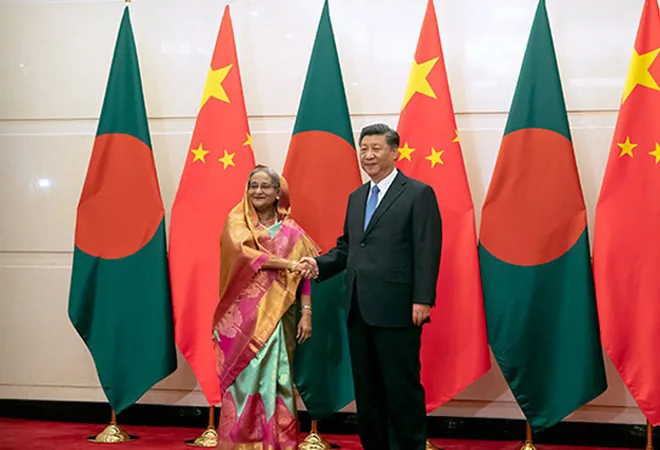Recently, China declared zero-duty for 97 percent of the Bangladeshi imports. The concession flowed from China’s duty-free, quota-free programme for the Least Developed Countries (LDC). This facility became operational from 1 July.
The Chinese move has been widely welcome in the country and is considered as a major diplomatic victory in the bilateral relations with China. Commentators and analysts have expressed optimism about the increase in the Bangladeshi exports to China and further deepening of the economic ties between the two countries, which is already going strong.
Since the Chinese decision coincided with the military standoff with India, it attracted wide international attention. The international community perceived the development to be a strategic move by China and termed it as an attempt to win Bangladesh, one of India’s close neighbours. However, amidst the hype surrounding the Chinese decision, an insight into the China- Bangladesh relationship makes one wonder if there is anything new to China’s declaration or it is just an extension of the existing privileges for all LCD countries, also to Bangladesh.
All-weather friend
The China-Bangladesh relationship started in 1975, shortly after the assassination of Sheikh Mujibur Rahman, Bangladesh’s first President and leader of the freedom struggle. Then on, it has grown steadily over the last four decades.
Bangladesh considers China as an ‘all-weather friend’ and the two countries have formed a strategic partnership. Also, Bangladesh is a prominent partner of China’s flagship Belt and Road Initiative (BRI) in South Asia.
Arguably, the economic ties have been a key driver behind the flourishing of the bilateral relationship. China is the biggest trading partner of Bangladesh and is the foremost source of imports. In 2019, the trade between the two countries was US$18 billion and the imports from China commanded the lion’s share. The trade is heavily in favour of China.
Given the large disproportionality in trade, Bangladesh has been urging China to take measures to reduce the trade imbalance. In 2015, China granted duty-free access to 3,095 Bangladeshi products to its markets. The present declaration that granted 5,161 products is an addition to the prevailing facilities. Bangladesh has also been enjoying preferential tariff facilities as a member of Asia Pacific Trade agreement, originally known as Bangkok agreement signed in 1975, which was rechristened in its present name in 2005.
China had instituted the duty-free quota privileges for the LDCs in 2010, and 24 countries were given this benefit initially. In 2015, Bangladesh was partially given this facility. Sixty percent of its export products were allowed to enjoy the zero-duty tariff scheme. Considering the deep bond between the two countries, such a privilege should have been given to Bangladesh much earlier. Often people were astonished at the hesitation of China, the world’s second-largest economy worth $14 trillion, to grant Bangladesh zero-duty benefits to all its products, a privilege granted by many countries much earlier.
The European Union (EU) was one of the first to provide duty-free access to Bangladeshi products under the Everything but Arms scheme in 1973. The facility significantly contributed to improving the country’s trade. The readymade garment (RMG) sector, primary an export-oriented industry, has been the principal beneficiary of this advantage.
The EU is the largest buyer of Bangladeshi RMG exports. Similarly, next-door neighbour India has also given the duty-free access to Bangladeshi products in 2011, except for 25 narcotic substances.
Delayed posture
The Chinese move is considered largely a delayed posture and the apprehension is about the length of the period Bangladesh will be able to enjoy the privilege. Bangladesh is all set to become a middle-income country (MIC) by 2024, and it’s promotion to MIC will curtail all the LDC privileges, including the duty-free facility. Hence, the Bangladeshi products are likely to enjoy duty-free advantage only for a short period.
Given the short window available to the country, there are doubt about the extent the privilege will contribute to narrowing the trade deficits. Experience suggests that enhancing exports cannot be achieved overnight and it requires time.
Recently, the Chinese envoy to Bangladesh indicated to Bangladeshi businesses to diversify their products and also enhance the quality to enjoy the benefit to its optimal. Analysts in Bangladesh feel that the trade gap with China will continue to grow. Dependence on China will also increase, primarily for the import of raw materials.
Free from comparison
It is uncanny to compare India and China. Relationship between the two countries should be free of comparison with a third country. The government of Bangladesh has been candid about its preference for promoting peace and it has careful in nurturing a friendly relationship with all countries.
Nevertheless, the country gives special emphasis to its relationship with China and India and the government should be credited for maintaining a warm relationship with the two countries. Sharing of warmth with the two major Asian countries has given Bangladesh dividend in the form of generous development assistance from China and India. China has promised around US$ 30 billion worth of financial assistance to Bangladesh. India has provided developmental assistance of worth US$10 billion. Bangladesh is the largest recipient of India’s total of US$30 billion developmental assistance offered to countries globally.
Comparing one against other creates unnecessary confusion. Here media and civil society could take a leading role in formulating a nuanced analysis of the issues and contribute to creating a positive environment. Also, prosperous nations have to shoulder responsibility, especially, in dealing with countries having asymmetries.
This commentary originally appeared in South Asia Weekly.
The views expressed above belong to the author(s). ORF research and analyses now available on Telegram! Click here to access our curated content — blogs, longforms and interviews.




 PREV
PREV


